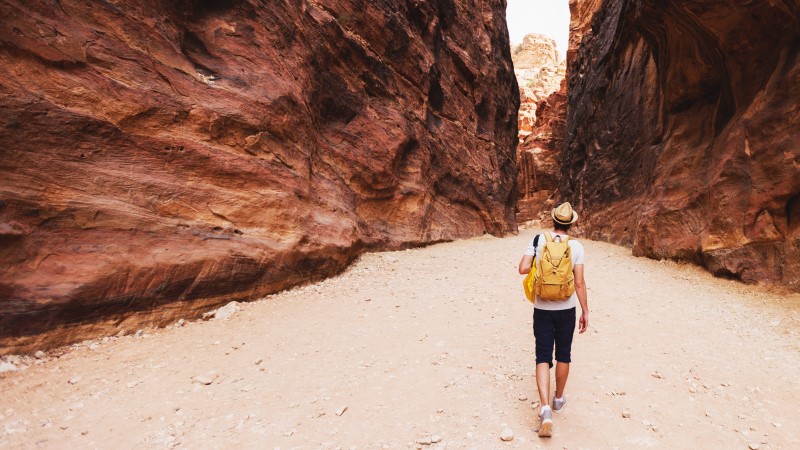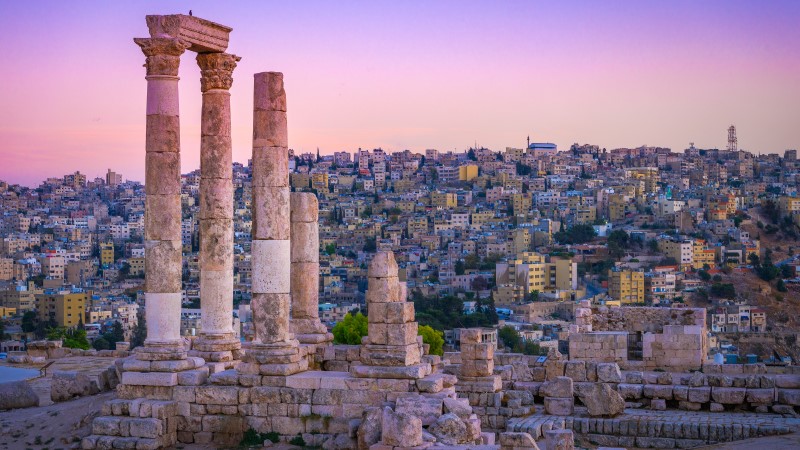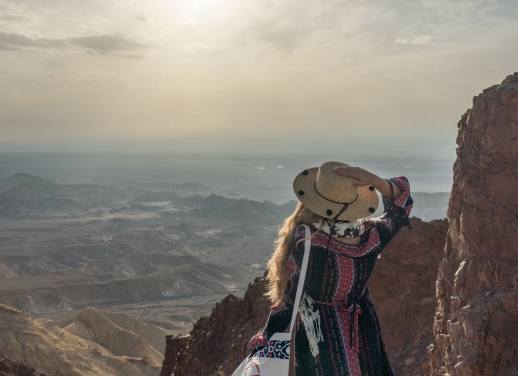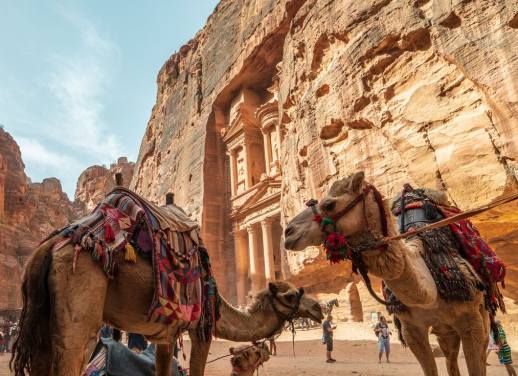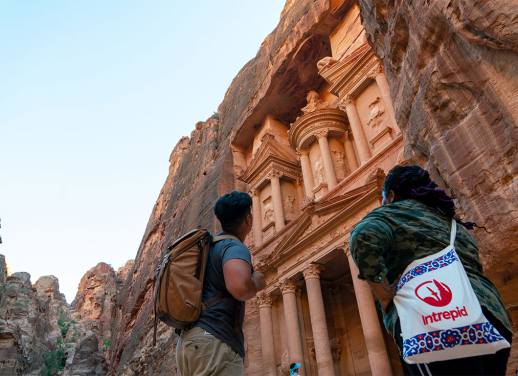As more and more people are starting to explore the Middle East, Jordan is soaring in popularity. With seas to float in, desert communities to stay with, tasty dishes to gorge on and archaeological sites to uncover – it’s easy to see why.
Because Jordan is still an emerging destination, travelling here is bound to stir up a few questions. But fear not, I’ve got you covered! From visas to money matters, cultural etiquette to dress code, here’s everything you need to know about visiting Jordan.
Visas
No matter where you come from you are going to need a visa to enter Jordan. The vast majority of nationalities are able to have theirs issued on arrival into Amman airport or at the Jordanian border. However, there are several others that will be required to obtain their visas ahead of arrival. Be sure to check out the Jordanian Tourist Board website for full details.
Whilst it often pays to be prepared, acquiring your visa from the Jordanian embassy in your home country can actually prove significantly more expensive than doing so on arrival. Try to resist the urge to do this if you don’t need to. A single-entry visa is valid for a month and costs 40 JOD (Jordanian Dinar) or around 56 USD.
Important: If you’re travelling from Egypt into Jordan on an Intrepid combo trip, you’re entitled to a free visa as long as the whole group arrives together. The same is not true of joining a Jordan-only tour as all group members are likely to be arriving individually.
GO NOW: DISCOVER EGYPT AND JORDAN ON THIS 15-DAY COMBO TRIP
Money
Despite the fact that the Middle East is often perceived as a cheap place to go, Jordan is not an inexpensive country. Travelling here on a group tour can provide excellent value for money, as paying for day trips, excursions and entry fees before you go can save you a considerable amount.
Jordanians use Jordanian Dinar (JOD), which is made up of 100 piastres and notes come in 1, 5, 10, 20 and 50 Dinar denominations. You can easily exchange major currencies such as GBP, USD, CAD, AUD and EUR on arrival, and exchanges and ATMs are widely available in larger towns and cities. Although attractions like Wadi Rum and Petra see hundreds of travellers each day you won’t find any ATMs here, so come armed with enough cash.
 The Middle East has a strong tipping culture that forms a part of everyday life, you’ll commonly hear this referred to as baksheesh. However, unlike Egypt where wages are very low and the poorest locals use this money to supplement their income, Jordanians would not expect a reward for tasks such as giving directions. In fact, many would likely refuse if you offered them anything. Tipping at restaurants and for local guides and porters is advised though.
The Middle East has a strong tipping culture that forms a part of everyday life, you’ll commonly hear this referred to as baksheesh. However, unlike Egypt where wages are very low and the poorest locals use this money to supplement their income, Jordanians would not expect a reward for tasks such as giving directions. In fact, many would likely refuse if you offered them anything. Tipping at restaurants and for local guides and porters is advised though.
As with most of the Middle East, haggling is a big deal in Jordan. This is particularly true when bargaining for souvenirs in the local bazaars. A few things to bear in mind are: don’t start haggling unless you’re really interested, have a price in mind, always ask the seller to start the bidding and then take it in turns to adjust your price.
RELATED: HOW TO SPEND THE PERFECT WEEK IN JORDAN
Safety
Given that Jordan borders the likes of Iraq, Syria and Saudi Arabia you could be forgiven for thinking that travelling in this tiny desert nation could present more of a risk than other destinations. But, if you take a look at last year’s Travel and Tourism Competitiveness Report you’ll see that Jordan ranks 38th out of 136 when it comes to safety and security. Actually, putting it ahead of a lot of European countries.
If you’re at all nervous about taking on Jordan alone, booking yourself onto a small group tour is a brilliant solution. Aside from being in the safe hands of a local expert leader, you’ll also experience the comfort of “safety in numbers”, as you explore the sights with a bunch of like-minded people.
CHECK OUT INTREPID’S FULL RANGE OF SMALL GROUP ADVENTURES IN JORDAN
Food and drink
For most the pull of Jordan comes from the chance to witness ancient Petra or to experience desert life in Wadi Rum – but the cuisine here should also play a part. Aside from chickpea-packed goodies like hummus and falafel and meaty morsels such as shish kebabs and shawarma, you have to try mansaf. Known as the national dish of Jordan, mansaf offers up a hearty meal of rice, slow-cooked lamb and jameed (a fermented yoghurt sauce) – simply delicious!
Even though 90 percent of Jordanians are Muslim, drinking alcohol in moderation is widely accepted. You’ll find beer and wine is often listed on hotel and restaurant menus, and there are even a few bars in popular tourist spots and some of the big cities, especially those with a significant Christian contingent. But, if you’re looking to avoid the booze altogether, limonana is a zingy alternative made from lemon, spearmint, ice and sugar.
This might surprise you but the tap water in Jordan is generally considered safe to drink. However, when travelling on a shorter trip it’s probably better to play it safe and stick to bottled water to avoid a sensitive stomach putting a dampener on your adventure.
RELATED: 7 FOODS YOU SHOULD TRY IN JORDAN
Toilets
If you’re squeamish about squat toilets, you’ll be relieved to hear that nearly all hotels and restaurants (even those of a lesser quality) have Western-style toilets. Regardless of the type of loo you come across, you’re unlikely to find toilet paper. So, if you’re averse to embracing the hose method of cleaning, it’s wise to carry some around with you. Make sure you don’t flush it though, as this causes unnecessary blockages, and place it in the basket provided instead.
Dress code

Photo captured by Amy Foyster
As was previously mentioned, Jordan is a predominantly Muslim country and so dressing conservatively acts as a sign of cultural respect. Shoulders and knees should be covered at the very least, and midriffs or cleavage should never be on show. Remember to dress particularly modestly when visiting sites of religious significance or else you may be denied entry.
Yes, Jordan is always warm, but you’ll soon discover that covering up with loose, lightweight and long clothing is not only a great way to keep cool but also to stay protected from the sun. If you’re going to be outside for large portions of the day, a sun hat wouldn’t go amiss either.
RELATED: YOUR DEFINITIVE JORDAN PACKING GUIDE
Cultural etiquette
Jordanians are very welcoming, so expect to be greeted warmly with an animated handshake and a barrage of questions. Coming from countries where strangers tend to stay that way, it’s often easy to be sceptical of such friendliness but trust that this is genuine curiosity and avoid being dismissive. Don’t be surprised if you’ve been invited to tea countless times and even for a full-blown meal at someone’s house by the time your trip comes to a close.
Certain parts of the country and Wadi Rum, in particular, are also heavily influenced by Bedouin culture. Amongst these nomadic folk, hospitality is thought of as an honour and a duty. As a guest, you can expect to be totally absorbed into the household by your host and treated as one of the family.
READ MORE: EVERYTHING YOU NEED TO KNOW ABOUT VISITING PETRA
Broadly speaking devout Muslim women do not tend to mix with men they don’t know, which can hinder female travellers’ chances to gain a real insight into local life as a woman here. Intrepid’s female-only expedition in Jordan works wonders to break down the barriers of traditional tourism and provides the opportunity to develop real bonds. From lazing on a ladies-only beach to learning the art of Arabic cooking from a female teacher, this trip does an amazing job of creating a deeper understanding of Middle Eastern women, their culture and customs.
Now you’re in the know, why not go ahead and book your Jordanian adventure today?

